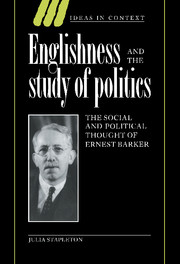Book contents
- Frontmatter
- Contents
- Acknowledgements
- Introduction: The ‘national character’ of Barker's thought
- 1 Lancashire, Idealism, and Whiggism: the making of an English political scientist
- 2 The polis, law, and the development of political studies at Oxford, 1900–1920
- 3 Society and the state in the English national past: the lure of Pluralism
- 4 Statehood, nationhood, and internationalism: English political theory and the First World War
- 5 Education and national character: the milieu of King's College London
- 6 ‘Continental’ political science and the Cambridge Chair
- 7 Traditions of civility: the construction of Englishness in the Second World War and beyond
- 8 The expansion of Englishness: the Books Commission, Europe, and the Commonwealth
- Conclusion: A late-Victorian liberal-conservative
- Select Bibliography
- Index
- Ideas in Context
8 - The expansion of Englishness: the Books Commission, Europe, and the Commonwealth
Published online by Cambridge University Press: 11 September 2009
- Frontmatter
- Contents
- Acknowledgements
- Introduction: The ‘national character’ of Barker's thought
- 1 Lancashire, Idealism, and Whiggism: the making of an English political scientist
- 2 The polis, law, and the development of political studies at Oxford, 1900–1920
- 3 Society and the state in the English national past: the lure of Pluralism
- 4 Statehood, nationhood, and internationalism: English political theory and the First World War
- 5 Education and national character: the milieu of King's College London
- 6 ‘Continental’ political science and the Cambridge Chair
- 7 Traditions of civility: the construction of Englishness in the Second World War and beyond
- 8 The expansion of Englishness: the Books Commission, Europe, and the Commonwealth
- Conclusion: A late-Victorian liberal-conservative
- Select Bibliography
- Index
- Ideas in Context
Summary
ENGLISH INTERNATIONALISM
Reviewing works by A.J. Toynbee and E.H. Carr immediately after the Second World War, Barker was made painfully aware of the ever-widening generation gap between himself and younger scholars. He could not share their dark, melancholy view of the world, rooted as it was in an analysis of ‘the disease of nationalism’ which appeared to have left Western civilisation in a state of terminal decline. All too conscious of his advancing years and no doubt the remoteness of the Mazzinian influences of his youth, he inquired ‘[d]oes a disease of nationalism [i.e. German nationalism] prove that nationalism is itself a disease?’ The unspoken answer was evidently no, and the silent example which supported it was the English nation; at any rate, he had always maintained that the latter was generally free of nationalism's vices. Gone too, or so it seemed, was the hope which an older generation had derived from contemplating the ‘spiritual’ forces at work in history; they now appeared as ‘quenched stars, or even as baleful lights’, yielding to the realities of ‘power and economics’ in international affairs.
Yet despite the loss of face which both nationalism and internationalism suffered after the war in some quarters, Barker continued to sanction both ideals and to assert – in true Mazzinian style – the inextricable link between them. Predictably, he regarded England as particularly well placed to strengthen this tie in world affairs.
- Type
- Chapter
- Information
- Englishness and the Study of PoliticsThe Social and Political Thought of Ernest Barker, pp. 177 - 197Publisher: Cambridge University PressPrint publication year: 1994

